Learn more:
HWA Awards
Explore
- About
- HWA Publications
- Bram Stoker Awards®
- Horror U
- Our Members Online
- For Members
- Scholarships
- Members’ Books By Year
- More…
- Contact HWA
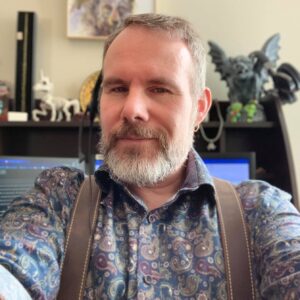
What inspired you to start writing?
I’ve always been a big reader. When I was in my teens, in the 80s, and figuring out who I was and my orientation, there weren’t any books that reflected me or guys like me. If there were gay characters they were side stories, often made out to be broken individuals, or mentally unstable, the first to die, or worse, the villain or antagonist of the story – because their sexual orientation made them that way. I didn’t like that. In my 40s, I started to review my accomplished bucket list of items and realized that writing had always been on there, but I hadn’t done anything about it. I started writing. But more importantly, I created worlds where the main characters were part of the LGBTQ+ world. I wanted people within my community to see that we could be the heroes. More importantly, I wanted the rest of the world to see that queer folk could be the heroes.
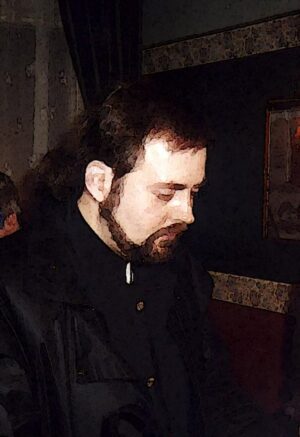
What inspired you to start writing?
I’ve always written, mostly for my own amusement, since I was a small child. To me, it was something you just ‘did’ - invented stories and fancies – and I sometimes found it odd that others didn’t. My own breakthrough moment was when I stopped drafting endless convoluted novels and went directly into writing short stories, novelettes, and novellas, most of which sold immediately. So I kept doing that.

What has writing horror taught you about the world and yourself?
My first published works are paranormal horror mysteries that delve into the world of the occult and various other things. It has been wonderful to learn even more about our world’s history and, though I had already assumed, how many things within the horror genre are based on old beliefs and myths that were once rooted in a true story. Every story has a root in some experience at one point in time.

What inspired you to start writing?
I’ve loved writing for so long I can’t remember starting! I was writing short stories at least as far back as second grade, maybe earlier. I’ve always been a voracious reader, and whenever I read something that I really love, I have to try to figure out how to do it myself.

Who are some LGBTQ horror authors you recommend our audience check out?
I always recommend that people start with the classics. Oscar Wilde created one of the greatest psychological horror stories in The Picture of Dorian Gray. The gay subtext that is baked into Dorian’s relationships with the men of the book, their own self-hatred, and inability to admit their love, jealousy, and obsession for Dorian leads to terrible fates for the female characters. William J. Martin (formerly Poppy Z Brite) has written some of the best, most luscious stories I’ve ever read.

What inspired you to start writing?
My pre-teen years were limned to AOL chat room roleplays and Livejournal blogging. Role-playing has a kink connotation to it (unless you worked in retail, by which, it’s the hellish exercise you’re coached with to practice customer service scenarios), but before websites like FanFiction.net or AO3 were popularized, roleplaying was the sort of way you’d collaboratively generate stories.
Who are some of your favorite LGBTQ characters in horror?
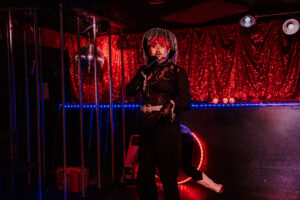
Most of my favorites are the ones I have written because they are the types of characters that I want to see and don’t really find anywhere else yet. Aside from my own though, it may be considered ‘typical’ of me, but I really like the characters from "The Vampire Chronicles" by Anne Rice. They are all so complex and morally gray, and all so damn charismatic.

What inspired you to start writing?
Writing came to me in my teens because none of the mainstream media I had access to included people like me, so I started making up my own stories. That makes it sound like an inspiring turn of events but really it was section 28 in the UK (prohibition of “promotion of homosexuality”) which was a horror story in itself that did significant harm to many people, and one we’re currently seeing repeated.

What was it about the horror genre that drew you to it?
It’s often about the beauty of the prose, but also It’s all about that adrenaline rush, yeah? I love that horror makes me feel something. You know, that “on the edge of your seat” feeling, with your heart pumping, the hair on your arm standing on end and your palms getting all clammy. Being scared is thrilling. It lets you know you’re alive.
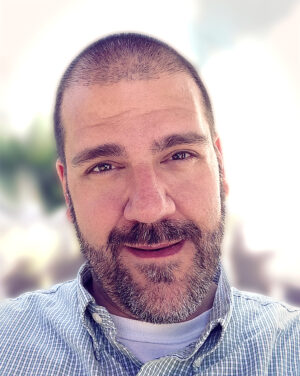
What inspired you to start writing?
I’m an only child. When I grew up, I spent a lot of time on my own making up stories. With my legos and stuffed animals, I would while away entire weekends in perfect bliss concocting elaborate dark fantasy worlds involving aliens, ghosts, and monsters. (Godzilla was a particular favorite.) Eventually, the toys disappeared, but the stories stuck around.

How do you feel the LGBTQ community has been represented thus far in the genre and what hopes do you have for representation in the genre going forward?
So in a lot of ways, there have been massive improvements in the last couple of decades. Where before we had Buffalo Bill and other such characters whose queerness is portrayed as a sort of villainy, now we’re getting a wild array of queer characters (often created by queer authors!) and this is wonderful news.

What inspired you to start writing?
It’s a cliché, but some of my first friends were books and book characters. It’s still true. I was always creating stories and narratives in my head. Plus, they kept giving me crayons and pencils as a little kid and wanted me to use them. I was inspired by the power of words to take me places, to evoke emotions, to escape reality. I wanted to share my inner worlds and stories.
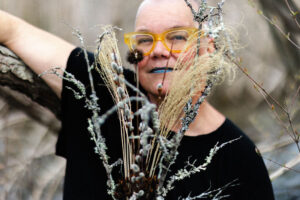
How do you feel the LGBTQ community has been represented thus far in the genre and what hopes do you have for representation in the genre going forward?
I just want to see a lot more writing where the trans, queer, or disabled character is the detective–not the monster. Or if they are the monster–make it a super delicious, seductive, world-devouring one.
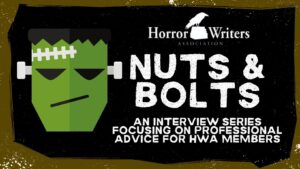
Publishing great horror authors proved more rewarding than he’d imagined,
so Crystal Lake Entertainment founder and CEO Joe Mynhardt took it a step further. He’s expanded what started as a small press into “a platform for launching careers.” In that spirit, Crystal Lake’s recent two-volume Shadows and Ink writing guide serves as a comprehensive education course for aspiring horror authors. In this month’s edition of Nuts & Bolts, Joe has agreed to share some advice on what beginning writers should know.